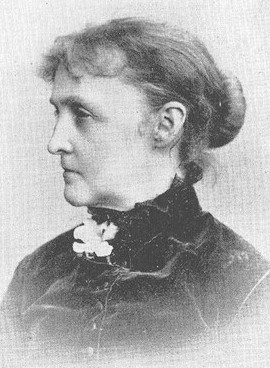Sarah Morgan Bryan Piatt

Sarah Morgan Bryan Piatt (August 11, 1836—December 22, 1919) was born on a plantation outside Lexington, Kentucky, to a family of slave owners, and related on her father’s side to Daniel Boone. She graduated from Henry Female College, and began publishing poems in 1854. In 1861, she married John James Piatt, known to friends as J.J., a journalist who had already published a book of poems. The young couple moved to DC, where her husband had secured a job as a clerk in the Treasury Department, and rented a home in what is today the Burleith neighborhood, north of Georgetown.
They remained until 1867, when J.J. lost his job, and while here, they began to raise a large family of eleven children, although only six would survive to adulthood. The family shuttled between government jobs in DC, when her husband could get them, and newspaper jobs in her husband’s native Ohio, when he could not. They returned to DC two more times when J.J. got jobs as librarian for the House of Representatives and with the postal service. His most successful government job came in 1884, when he was appointed American consul in Ireland. The family would spend eleven years in Cork, Ireland. In 1914, J.J. was seriously injured in a carriage accident and never fully recovered. He died in 1917, and the widowed Sarah moved in with a son in New Jersey, dying herself in 1919.
Although J.J. had published more than his wife when they first married, her poems soon eclipsed his, both in popularity and in number. He struggled to maintain the appearance of parity with her, but her work was distinctly preferred by magazine editors, and she published poems for adults and children regularly in leading periodicals in the US and Great Britain, including Atlantic Monthly, Harper’s, Scribner’s, Irish Monthly, and The Independent. She published 18 books, two of which were co-authored with J.J. Her book titles include: The Nests at Washington and Other Poems (1864, co-written with J.J.), A Woman’s Poems (1871), A Voyage to the Fortunate Isles (1874), That New World (1877), An Irish Garland (1885), The Witch in the Glass (1888), An Enchanted Castle (1893), and Complete Poems (1894).
The Piatts developed friendships with a number of other writers, including William Dean Howells and Oliver Wendell Holmes. In DC, they became part of a lively group of literary government clerks and journalists (and their spouses), making the acquaintance of Walt Whitman, John Burroughs, William Douglas O’Connor, Grace Greenwood, George Alfred Townsend, John Willis Menard, and others.
Sarah Piatt’s poems are notable for their use of dialogue and their irony, although in other ways they conformed to the genteel tradition of Victorian era poetry. She wrote often of motherhood and children, but also of politics and current events, and there is also a strong yearning for social justice in her work, and a large number of her poems are about the devastation of war and war’s aftermath. I have reprinted a selection of her Civil War poems here. They are of special interest not only because they reflect her time spent in DC, but because the war galvanized the poet, forcing her to re-think her assumptions about her happy Southern childhood, her family’s complicit role in slavery, and her era’s romanticized ideals about war. She is one of the best-published American women writers of the late 19th century.